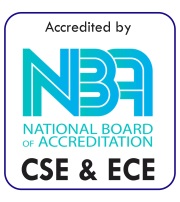COMPUTER SCIENCE AND ENGINEERING
PEO1: To acquire logical and analytical skills in core areas of Computer Science & Information Technology.
PEO2: To adapt new technologies for the changing needs of IT industry through self-study, graduate work and professional development.
PEO3: To demonstrate professional and ethical attitude, soft skills, team spirit, leadership skills and execute assignments to the perfection.
Program Specific Outcomes :
PSO1: Software Development :Ability to grasp the software development life cycle of software systems and possess competent skill and knowledge of software design process.
PSO2: Industrial Skills Ability:Ability to interpret fundamental concepts and methodology of computer systems so that students can understand the functionality of hardware and software aspects of computer systems.
PSO3: Ethical and Social Responsibility: Communicate effectively in both verbal and written form, will have knowledge of professional and ethical responsibilities and will show the understanding of impact of engineering solutions on the society and also will be aware of contemporary issues.
Program Outcomes :
PO1 : Engineering Knowledge: Apply the knowledge of mathematics, science, engineering fundamentals and an engineering specialization to the solution of complex engineering problems
PO2 : Problem Analysis: Identify, formulate, review research literature, and analyze complex engineering problems reaching substantiated conclusions using first principles of mathematics, natural sciences and Engineering sciences.
PO3 : Design/Development of Solutions: Design solutions for complex engineering problems and design system components or processes that meet the specified needs with appropriate consideration for the public health safety, and the cultural, societal, and environmental considerations.
PO4 : Conduct Investigations of Complex Problems: Use research-based knowledge and research methods including design of experiments, analysis and interpretation of data, and synthesis of the information to provide valid conclusions.
PO5 : Modern Tool Usage: Create, select and apply appropriate techniques, resources and modern engineering and IT tools including prediction and modeling to complex engineering activities with an understanding of the limitations.
PO6 : The Engineer and Society: Apply reasoning informed by the contextual knowledge to assess societal, health, safety, legal and cultural issues and the consequent responsibilities relevant to the professional engineering practice.
PO7 : Environment and Sustainability: Understand the impact of the professional engineering solutions in societal and environmental contexts and demonstrate the knowledge of,and need for sustainable development.
PO8 : Ethics: Apply ethical principles and commit to professional ethics and responsibilities and norms of the engineering practice.
PO9 : Individual and Team Work: Function effectively as an individual and as a member or leader in diverse teams and in multidisciplinary settings.
PO10 : Communication: Communicate effectively on complex engineering activities with the engineering community and with society at large, such as being able to comprehend and write effective reports and design documentation, make effective presentations and give and receive clear instructions.
PO11 : Project Management and Finance: Demonstrate knowledge and understanding of the engineering management principles and apply these to one's own work, as a member and leader in a team to manage projects and in multidisciplinary environments.
PO12 : Life-Long Learning: Recognize the need for and have the preparation and ability to engage in independent and lifelong learning in the broadest context of technological change.




